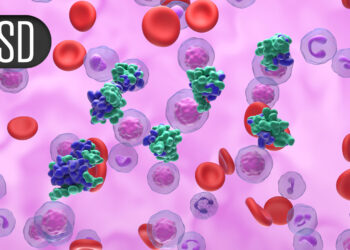TOPLINE:
A new algorithm for estimating left ventricular filling pressure (LVFP) by echocardiography reduced indeterminate results to just two cases compared with 38 using previous guidelines, achieving 86% accuracy in 949 patients, a new study found. The algorithm showed particular improvement for patients with normal left ventricular ejection fraction (LVEF), while maintaining similar accuracy for cases of reduced LVEF.
METHODOLOGY:
- Researchers conducted an observational study involving 951 patients referred for cardiac catheterization across multiple centers in the United States, Norway, South Korea, Spain, and Japan.
- The analysis included echocardiographic measurements of mitral inflow; the velocities of the pulmonary vein, tissue Doppler mitral annulus, and tricuspid regurgitation; as well as left atrial strain.
- LVFP greater than 15 mm Hg was designated as abnormally elevated.
- A secondary evaluation incorporated left atrial reservoir strain, left atrial maximum volume index, isovolumic relaxation time, and pulmonary vein flow when initial variables were discordant or incomplete.
TAKEAWAY:
- The new algorithm achieved a sensitivity of 86% and a specificity of 86%, with an overall accuracy of 86% in 949 patients, significantly outperforming joint 2016 guidelines from the American Society of Echocardiography and the European Association of Cardiovascular Imaging (P < .0001).
- For patients with normal LVEF, the algorithm demonstrated 85% sensitivity, 87% specificity, and 86% accuracy, showing significant improvement over previous guidelines (P < .0001).
- In patients with reduced LVEF, the algorithm had 92% sensitivity, 77% specificity, and 87% accuracy.
- The model also was more accurate than the guidelines for patients with an ejection fraction of 50% or greater (P < .0001).
- The net reclassification improvement for echocardiography over natriuretic peptides was 1.1 (P < .0001), with integrated discrimination improvement of 0.3 (P < .0001).
IN PRACTICE:
“Application of the new algorithm should result in an increase in the number of patients in whom LV filling pressure can be estimated,” the researchers reported. “Application of the new algorithm should result in high accuracy in determining LV filling pressure in patients with normal LV ejection fraction. The new algorithm can be combined with natriuretic peptides to correctly identify patients with heart failure.”
SOURCE:
The study was led by Hossam Lababidi, MD, of Methodist DeBakey Heart and Vascular Center in Houston. It was published online in Circulation.
LIMITATIONS:
The study did not examine the role of diastolic stress testing, which is recommended for symptomatic patients with grade 1 diastolic dysfunction. The majority of patients also underwent cardiac catheterization for dyspnea evaluation or heart failure management, suggesting the sample had a higher likelihood of elevated LVFP. The researchers noted that accuracy may be lower when applied to populations with lower prevalence of cardiovascular disease.
DISCLOSURES:
One of the investigators disclosed being a co-inventor of method for myocardial segment work analysis and estimation of blood pressure in the heart and received speaker honorarium from GE HealthCare.
This article was created using several editorial tools, including AI, as part of the process. Human editors reviewed this content before publication.
Source link : https://www.medscape.com/viewarticle/novel-algorithm-transforms-echocardiographic-assessment-2025a1000ia3?src=rss
Author :
Publish date : 2025-07-10 06:27:00
Copyright for syndicated content belongs to the linked Source.









